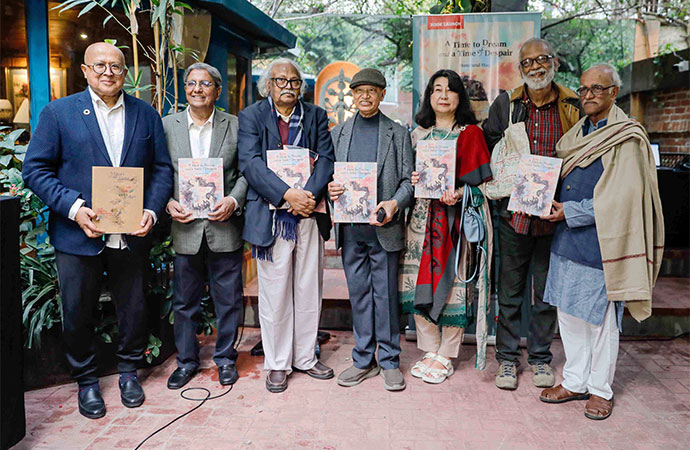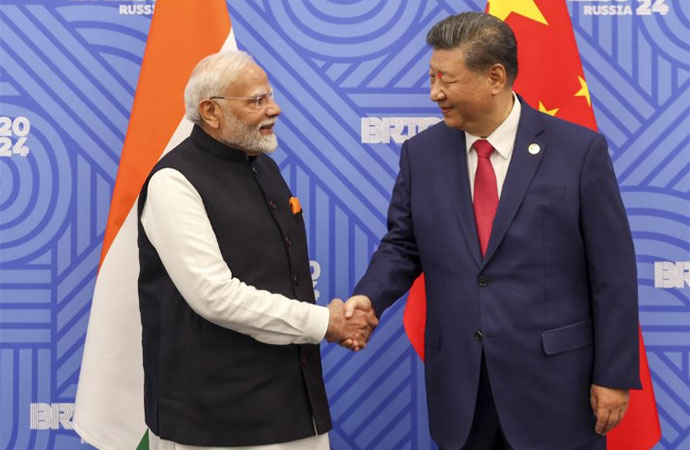Essays

Enayetullah Khan, Matiur Rahman, Rafiqun Nabi, writer Monzurul Huq and his wife Yoko Kikuchi, Afsan Chowdhury and Mofidul Haque at the launch of the book on the Liberation War, 'A Time to Dream and a Time of Despair' (from left). This Monday afternoon, the Garden Gallery in Baridhara. Photo: UNB
The Liberation War is the eternal glory of Bengalis. The memories of the Liberation War will continue to flow from mouth to mouth with joy and sorrow. Future Bengalis will gain the courage and inspiration to move forward by embracing the spirit. In that vein, the official release of a memoir book on the Liberation War in the first month of the year was held on Monday.
The cover of the book titled 'A Time to Dream and a Time of Despair' written in English by prominent Japanese-born journalist Monzurul Huq was unveiled at the Garden Gallery Cosmos in Baridhara. The book has been published by Cosmos Books with the support of Cosmos Foundation. It highlights the events of the Liberation War in a total of 14 chapters. At the beginning of each chapter, there is an artwork by artist Sourav Chowdhury, keeping in tune with the subject.
Monzurul Huq's first book on the Liberation War, 'A Story of My Time', was published by Cosmos Books in December 2022. 'A Time to Dream and a Time of Despair' is the second part. In these two autobiographical books, author Monzurul Huq has presented the context of the Liberation War, the war and his own experience of going to war from his personal experience.
Welcoming the guests present at the publication ceremony in the afternoon, Cosmos Foundation Chairman Enayetullah Khan said that author Monzurul Huq has a long friendship of 60 years with him. Their friendship is still unbroken. The first book he wrote on the Liberation War created interest among readers. Now, with the publication of the second part, his writing on this subject has been completed.
Prothom Alo Editor Matiur Rahman was the chief guest at the ceremony. He said that Enayetullah Khan has good friends. He has good friendships with many people including Monzurul Huq Afsan Chowdhury, Hasan Ferdous, Dr. Haider Ali Khan. The publication of the book is due to love for his friends, not to earn money by selling it. About the book, he said that Monzurul Huq saw new history being created before his eyes. When the curfew was relaxed on March 25 and 26, 1971, he left their house on a bicycle. Sergeant Zahurul Haque of Dhaka University saw the bodies of two friends in the hall. He was overwhelmed by the destruction of Jagannath Hall and Shaheed Minar. The besieged city of Dhaka. The frightening environment. From Dhaka, they went to the village. They went to Agartala to join the Liberation War. That journey was also fraught with danger. Camp life. He returned to Dhaka on December 17 on the path to victory in the war. He has described all this in the book.
Guest speaker at the event, Liberation War researcher Afsan Chowdhury said that he was friends with Monzurul Huq from Dhaka College. They practiced art and literature together in the sixties. They participated in the movement. The author has presented the perspective of how 1971 emerged from our society in this book. In 1971, there was an attempt by our society to be free. This attempt has been raised in the book.
Essayist and trustee of the Liberation War Museum, Mofidul Haque said, society, country, people are governed by time. In these two books, the author has highlighted a glorious period in our history.
Renowned artist Emeritus Professor Rafiqun Nabi said, this is an exceptional book. Author Monzurul Huq has written the history of the Liberation War from his own experience. Many events in this book awaken the memories of that time.
In his response, Monzurul Huq said, although many books have been written in Bengali on the Liberation War, the number of books written in English for foreign readers is very small. That is why he felt the need to write this book in English. He does not agree to call these two books traditional history books. They are mainly written in the light of personal memories and experiences. In the first book, he highlighted the background of the Liberation War, the movement of the sixties, etc. This part ended on March 24, 1971. This new book of the second part includes the massacre of the Pakistani occupation forces in Dhaka, the frightening atmosphere of politics, people fleeing their homes in fear of their lives, his participation in the Liberation War, training in guerrilla warfare and entering the country after the victory. He wrote the book for his next generation. Referring especially to his two granddaughters, he said that his attempt to write this book was so that they and their next generation could know about this glorious achievement of the nation.
Monzurul Huq is a writer, journalist and teacher. He has a master's degree from Moscow University and London University. He has worked in journalism at the BBC. He has been living in Japan permanently since 1994. He teaches journalism at NHK Radio in Japan and as a visiting professor at the University of Tokyo. He is working as the Japan correspondent of Prothom Alo. Earlier, he has published several books on history, art, culture and literary criticism.
At the end of the discussion, there was a poetry recital performed by Shatabdi Saha.
This review first appeared in Prothom Alo, from where it has been translated.

























Leave a Comment
Recent Posts
Auspicious beginnings, but a l ...
The newly elected government of Bangladesh is now in office, and the e ...
Caught between tigers and pira ...
Over 10,000 fishermen in the Sundarbans have suspended their fishing a ...
Historic Chawk Bazar comes alive with iftar items on ..
Shaping Young Conservationists: School Conservation ..
Iran has said it has reached an understanding with t ..
New Finance Minister Amir Khosru Mahmud Chowdhury